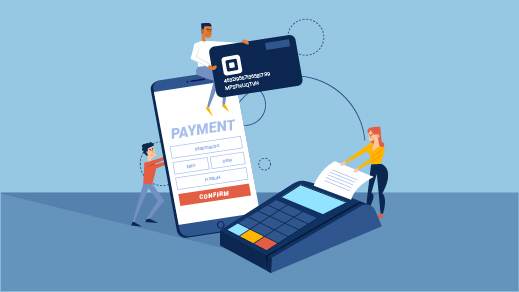Square and PayPal are two of the most widely used payment processing platforms among small business owners. Accepting electronic payments is important to stay ahead, particularly in the ecommerce industry.
Choosing the right payment platform is an important decision that can greatly impact the success of your ecommerce business or any other digital platform.
Square and PayPal are both great options for large-scale or medium-sized enterprises! They are among the top contenders in the market and have gained much popularity in a short span of time.
In this article, we’ll get into a detailed comparison of Square and PayPal. We aim to help you make an informed decision that suits your needs and goals perfectly.
Let’s get started!
Understanding Square
A payment processing solution that has gained immense popularity in recent years. Square, founded in 2009 by Jack Dorsey and Jim McKelvey, has completely transformed how small businesses can accept credit card payments.
It all started with a pocket-size white card reader that you could easily plug into your smartphone or tablet.
This intelligent device made it easy for anyone to process card transactions without any hassle. Since then, Square has been great at expanding its services to include a wide range of payment solutions, making it a reliable payment platform for businesses.
The company’s gross payment volume in the most recent reported quarter was 52.5 billion US dollars.
Benefits of using Square
Certainly, here are some benefits of using the Square Payment Gateway:
Simple Setup & configuration:
One of the standout advantages of Square is its ease of use and straightforward setup process. Businesses can sign up quickly, and the platform is specially designed to be user-friendly, making it accessible to those with minimal technical knowledge.
Diverse Range of Services:
Square has come a long way from its original card reader, now offering a suite to meet the needs of different businesses.
Whether you prefer in-person transactions with card readers and POS systems or online payments through virtual terminals, Square will be your first choice.
No Monthly Fees:
Square’s pricing model is transparent. You don’t need to worry about monthly subscription fees or minimum processing requirements. This feature is for small businesses and startups with limited budgets.
Inventory Management and Analytics:
Square offers additional features to help you out! With Square, you can easily manage your inventory, get real-time sales analytics, and access reporting tools.
These features give you valuable insights into your business operations.
Limitations of Square
Transaction Fees:
Square’s transaction fees are quite competitive, although they may not always be the lowest in the market. This is especially true for certain card types or online transactions.
Payout Time:
Some businesses have experienced delays in receiving funds. Square may hold transactions for review, especially for new or high-risk accounts. This might have an impact on the cash flow of certain businesses.
Understanding PayPal
PayPal, founded in 1998 by Max Levchin, Peter Thiel, and Luke Nosek, has long been a pioneer in the online payment industry.
Originally intended to facilitate secure online payments between individuals, PayPal quickly evolved into a global payment platform serving both businesses and consumers.
PayPal’s payment volume increased 10.8% in the second quarter of 2023.
Benefits of using PayPal
Certainly, here are some benefits of using PayPal:
Widely Accepted:
PayPal’s popularity and widespread acceptance make it a convenient choice for businesses and customers alike.
Many consumers are familiar with the platform and can make payments without sharing their sensitive financial information with the merchant.
International Transactions:
With support for multiple currencies and a global network, PayPal is well-suited for businesses that conduct international transactions.
Buyer and Seller Protection:
PayPal offers buyer protection, ensuring customers feel confident making purchases, while seller protection helps reduce the risk of business chargebacks.
Easy Integration:
PayPal seamlessly integrates with a wide range of eCommerce platforms, making it convenient for online businesses to start accepting payments quickly.
Limitations of PayPal
Account Freezes and Holds:
PayPal’s rigorous security measures can sometimes lead to account freezes or holds, which can cause inconvenience and delays for businesses in accessing their funds.
Customer Service:
Some users have reported challenges in reaching PayPal’s customer support, leading to potential delays in resolving issues.
Square vs PayPal: Feature Comparison
Transaction Fees:
Both Square and PayPal charge transaction fees for each payment received. Square typically follows a flat-rate pricing model, simplifying fee calculations.
On the other hand, PayPal’s fees may vary based on the transaction amount and currency, and they may include additional fees for cross-border transactions.
Payment Processing Options:
Square primarily excels in in-person payments through card readers and POS systems. It has a strong presence in retail and hospitality businesses that rely on face-to-face transactions.
On the contrary, PayPal is more prominent in online transactions, making it a preferred choice for eCommerce businesses.
Security Measures:
Both Square and PayPal prioritize the security of financial transactions and customer data. They employ industry-standard encryption and security protocols to secure financial information and reduce the risk of fraudulent activities.
Ease of Use and Integration:
Square’s user-friendly interface and quick setup process make it a better choice for all businesses requiring immediate implementation.
Additionally, Square seamlessly integrates with various third-party apps and services, enhancing its functionality and providing additional user benefits.
Similarly, PayPal offers a user-friendly interface and easy integration with numerous eCommerce platforms. Its widespread adoption familiarizes customers with the payment process, increasing checkout convenience.
Customer Support and Reputation
Both Square and PayPal have diverse reputations and user reviews. Square has earned much acceptance for its ease of use, transparent pricing, and comprehensive features that cater to various business needs.
It has been especially popular among small businesses and mobile vendors.
As an established global player, PayPal boasts a large user base and high recognition. It has gained trust over the years, making it a preferred choice for international transactions and online payments.
Making an Informed Decision
Assessing your business’s unique requirements is crucial when deciding between Square and PayPal. Consider the nature of your transactions (in-person or online), your target audience, and your growth plans.
Square may be an ideal choice for large to medium-scale businesses that require a simple and comprehensive payment solution, particularly if they operate in in-person sales environments.
The lack of monthly fees and the convenience of a single pricing model may appeal to businesses with a relatively stable sales volume.
On the other hand, PayPal is well-suited for businesses with a strong online presence and a global customer base.
Its widespread acceptance and support for multiple currencies make it an excellent choice for eCommerce and international transactions.
Conclusion
In conclusion, Square and PayPal offer valuable payment solutions, each catering to different business models and requirements.
While Square excels in in-person transactions with its card readers and comprehensive features, PayPal shines in the online payment space with its global reach and buyer protection.
To make the right decision, thoroughly evaluate your business needs, the transaction volume, and your customer’s payment preferences.
Whichever platform you choose, embracing a secure and reliable payment solution will undoubtedly enhance customer experience and contribute to your business’s growth and success.
Frequently Asked Answers
- What are the transaction fees for using Square and PayPal?
Square: Square charges a fixed cost for every payment. Depending on the country and area, in-person purchases cost 2.6 percent + $0.10, and online payments cost 2.9 percent + $0.30.
PayPal: PayPal’s transaction fees depend on the amount, kind of payment (domestic or international), and currency. US domestic payments cost 2.9 percent + $0.30, and cross-border transactions cost more.
- Can I use both Square and PayPal for my business?
Square and PayPal are both business options. Many businesses offer multiple payment choices to satisfy consumer preferences. Your payment system can benefit from Square and PayPal integration.
- Does Square offer the same level of security as PayPal?
Square and PayPal protect user data and transactions with strong security. Encryption techniques and industry standard practices provide security. Reviewing their security rules might help you understand how the two platforms handle security.
- What is the stock performance comparison between Square and PayPal?
To compare stock performance accurately, check the newest data. Potential investors should research before investing because past performance does not guarantee future results.
- What are the differences between the PayPal card reader and Square’s card reader?
PayPal Card Reader: PayPal offers card readers for various payment circumstances. “PayPal Chip and Swipe Reader” is the main card reader. This reader lets businesses accept chip and magnetic stripe cards. PayPal’s “PayPal Chip and Tap Reader” supports Apple Pay and Google Pay.
Square Card Reader: Square offers multiple card readers. “Square Reader for Magstripe” takes magnetic stripe cards and is the most common. “Square Reader for Contactless and Chip” enables chip cards and contactless payments like Apple Pay and Google Pay.
- What is the main difference between SumUp and Square?
SumUp and Square are payment processing solutions, but SumUp focuses on simplicity and low fees, while Square offers a broader range of features, including point-of-sale hardware.




